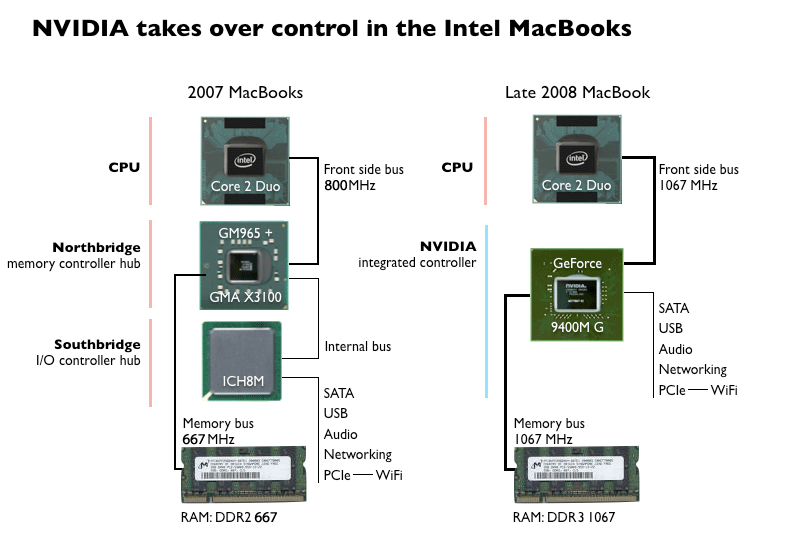In the complaint filed Monday in Delaware Chancery Court, Intel alleges that NVIDIA's plans to develop chipsets for Intel's emerging Nehalem microarchitecture will violate a patent-licensing agreement the two Santa Clara, Calif.-based companies signed back in 2004.
That agreement paved the way for NVIDIA's MCP79 platform, a chipset compatible with Intel's current-generation of Core processors, to find its way into Apple's entire notebook family last October at Intel's expense. However, Intel maintains that the agreement does not extend to new processors that include integrated memory functionality.
"Our suit seeks to have the court declare that NVIDIA is not licensed to produce chipsets that are compatible with any Intel processor that has integrated memory controller functionality, such as Intel's 'Nehalem' family of processors, and that NVIDIA has breached the agreement with Intel by falsely claiming that it is licensed," an Intel spokesperson told AppleInsider. "Nothing in the 2004 license agreement extends NVIDIA's rights to Intel's new CPU architecture."
Both sides have discussed the matter in private for months, and the suit signals Intel's belief that it's run out of alternatives and won't be able to reach an out-of-court arrangement, the Wall Street Journal, which broke word of the suit, reported on its website Thursday.
Speaking to AppleInsider, the Intel spokesperson said discussions to prevent a drawn-out legal bout had actually been ongoing for "more than a year", and the chipmaker hopes the dispute "will not impact other areas of our companies' working relationship."
Since it is believed that the majority of Intel's chips down the road will have integrated memory controllers, as Nehalem does, the suit could have the effect of squeezing NVIDIA out of future chipset markets should Intel prevail.
Nehalem is Intel's codename for a new processor microarchitecture. It's intended to replace the Core microarchitecture found in Apple's existing family of Macs.
The Journal report erroneously mentioned that NVIDIA's Ion chipset is in use with Intel Atom processors in Apple's newest computers, but those Macs actually team Intel Core processors with NVIDIA's MCP79 platform. Apple is not deploying Atom or Ion in any of its products at this time.
Instead, Apple is favoring NVIDIA's MCP79 platform over Intel's own chipset architecture in new Macs, which results in the Mac maker being able to deploy a single, compact chip inside its new systems instead of two.
Proprietary features of MCP79 include DriveCache, which uses flash storage to speed up loading times, and Hybrid SLI, which switches from discrete to integrated graphics to increase battery life. It's also been rumored that NVIDIA chipsets will be used in new iMacs and Mac minis when those models are introduced in the coming weeks and months.
NVIDIA did not respond to requests for comment at press time.
 Kasper Jade & Zach Spear
Kasper Jade & Zach Spear







-m.jpg)






 Charles Martin
Charles Martin

 Malcolm Owen
Malcolm Owen
 William Gallagher
William Gallagher
 Christine McKee
Christine McKee
 Marko Zivkovic
Marko Zivkovic
 Mike Wuerthele
Mike Wuerthele








34 Comments
Intel probably asked nVidia to sign a further icense agreement and demanded more cash, obviously nVidia didn't play ball so intel have gone to Delaware, the suing capital of the world to seek revenge.
Oo, Look who got a Boo Boo!!! Well it happened cause Intel never bothered to do some real improvement over their GMA line.
It's a shame that Intel does not invest in better chipsets with high performance feautres, they wouldn't have to worry about nVidia then.
Perhaps this squabble is causing the delay of the Mac Pro update?
Oo, Look who got a Boo Boo!!! Well it happened cause Intel never bothered to do some real improvement over their GMA line.
It's a shame that Intel does not invest in better chipsets with high performance feautres, they wouldn't have to worry about nVidia then.
So true, while i am a Intel supporter, I hope Nvidia really win this one out. Intel have been giving some crappy chipset and Graphics to us for MANY years.....
Consumers have been suffering because of this. If EU really care about Anti Competitive please have Intel on its list and help Nvidia get their Decent chipset to us.